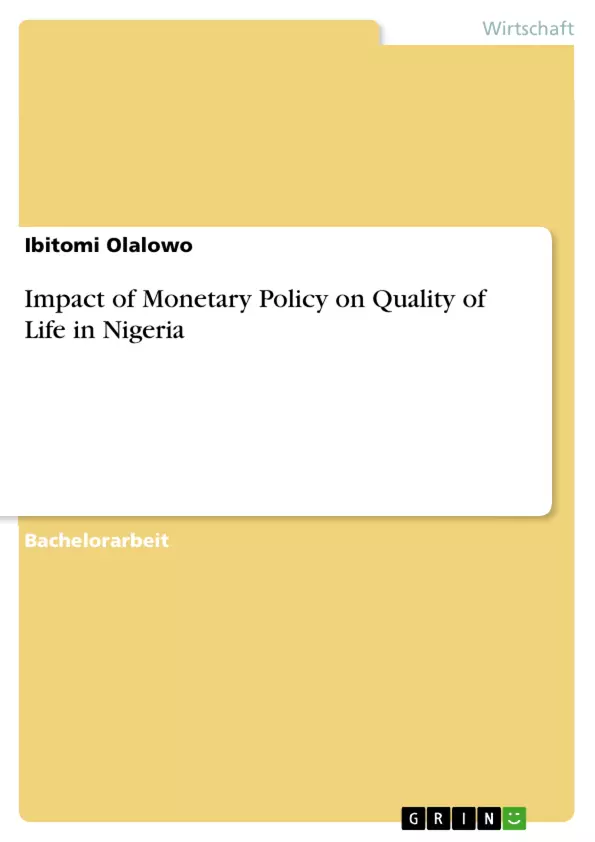This study investigates the impact of monetary policy on the quality of life in Nigeria, the Maslow’s hierarchy of needs was adopted as a theoretical framework, the dataset covers a period of 37 year (1981-2018) and the model was estimated using Autoregressive Distributed Lag method of estimation. The study seeks to address the following questions: What is the trend and trajectory of the determinant of quality of life? What is the important of monetary policy on the determinant of quality of life?
Over the years, monetary variables such as inflation and interest rate have continued to fluctuate, thereby affecting many macroeconomic variables. Among which quality of life and cost of living is continually affected. For instance, standard of living is continually being eroded by high inflation in the country. Inflation rate was more than 18% in the first quarter of 2021. While inflation is rising cost of living in the country and therefore quality of life is declining.
Furthermore, several efforts to keep inflation low, the monetary authority have raised the nominal interest rate severally in attempt. However, it appears that the other measure of quality of life such as unemployment is also rising and also human development index (HDI), genuine progress indicator (GPI) and gross domestic happiness (GDH) are declining. Fixed income earners and saving are fast losing the value of their wealth, meaning that it is the relative value of money that define the determinant of quality of life. Thus, keeping in check the rate of inflation and interest rate.
Inhaltsverzeichnis
- KAPITEL EINS
- 1.0 Hintergrund der Studie
- 1.1 Problemstellung der Forschungsarbeit
- 1.2 Forschungsfragen
Zielsetzung und Themenschwerpunkte
Diese Forschungsarbeit befasst sich mit den Auswirkungen der Geldpolitik auf die Lebensqualität in Nigeria. Sie zielt darauf ab, das Verhältnis zwischen verschiedenen geldpolitischen Instrumenten und Faktoren, die die Lebensqualität beeinflussen, zu untersuchen. Der Fokus liegt auf der Analyse des Einflusses der Geldpolitik auf die Lebensqualität in Nigeria im Zeitraum von 1981 bis 2018.
- Einfluss der Geldpolitik auf die Lebensqualität in Nigeria
- Analyse der Beziehung zwischen Geldpolitik und wichtigen Determinanten der Lebensqualität
- Bewertung des Einflusses von Inflation und Zinssätzen auf die Lebensqualität
- Untersuchung der langfristigen Auswirkungen der Geldpolitik auf die Lebensqualität
- Entwicklung von Empfehlungen für eine effektivere Geldpolitik, die zur Verbesserung der Lebensqualität beiträgt
Zusammenfassung der Kapitel
Kapitel 1: Dieser Abschnitt liefert eine umfassende Einführung in die Studie und beleuchtet den Hintergrund der Untersuchung. Die Bedeutung der Lebensqualität im Kontext der menschlichen Entwicklung wird erläutert, wobei der Schwerpunkt auf den multidimensionalen Aspekten dieses Konzepts liegt. Die Forschungsfrage wird aufgestellt und die Ziele der Studie werden definiert.
Schlüsselwörter
Geldpolitik, Lebensqualität, Nigeria, Inflation, Zinssätze, Realeinkommen, Sparen, Maslows Bedürfnispyramide, Autoregressive Distributed Lag (ARDL)-Modell, Granger-Kausalität.
Häufig gestellte Fragen
Wie beeinflusst die Geldpolitik die Lebensqualität in Nigeria?
Geldpolitische Instrumente wie Zinssätze und Inflation wirken sich direkt auf das Realeinkommen, die Ersparnisse und somit auf den allgemeinen Lebensstandard aus.
Welche Rolle spielt die Inflation für die Nigerianer?
Hohe Inflationsraten (über 18% im Jahr 2021) führen zu steigenden Lebenshaltungskosten und einer Erosion des Wohlstands, insbesondere bei Festgeldbesitzern.
Was ist das ARDL-Modell?
Das Autoregressive Distributed Lag (ARDL)-Modell ist ein statistisches Verfahren, mit dem langfristige Beziehungen zwischen ökonomischen Variablen untersucht werden.
Warum wird Maslows Bedürfnispyramide in der Studie erwähnt?
Sie dient als theoretischer Rahmen, um zu definieren, welche menschlichen Bedürfnisse durch wirtschaftliche Stabilität befriedigt werden müssen, um Lebensqualität zu sichern.
Was sagt der Human Development Index (HDI) über Nigeria aus?
Die Studie stellt fest, dass trotz geldpolitischer Maßnahmen Indikatoren wie der HDI sinken, was auf eine Verschlechterung der Lebensbedingungen hindeutet.
- Quote paper
- Ibitomi Olalowo (Author), 2021, Impact of Monetary Policy on Quality of Life in Nigeria, Munich, GRIN Verlag, https://www.grin.com/document/1376620



